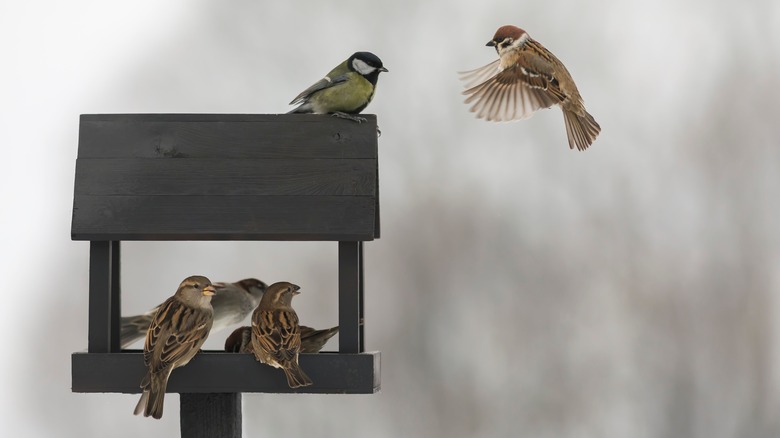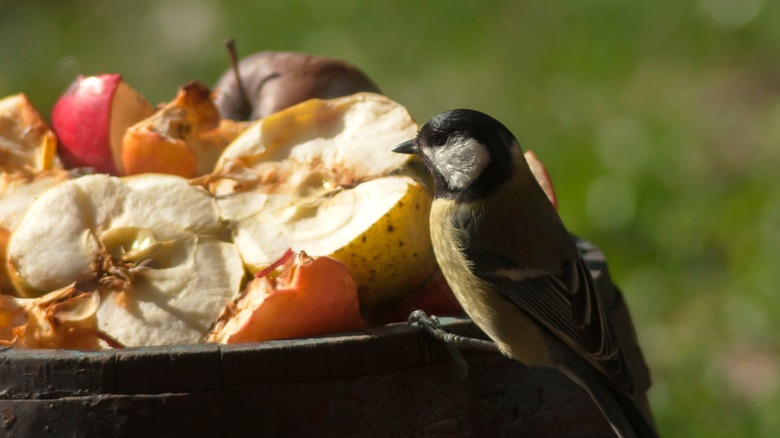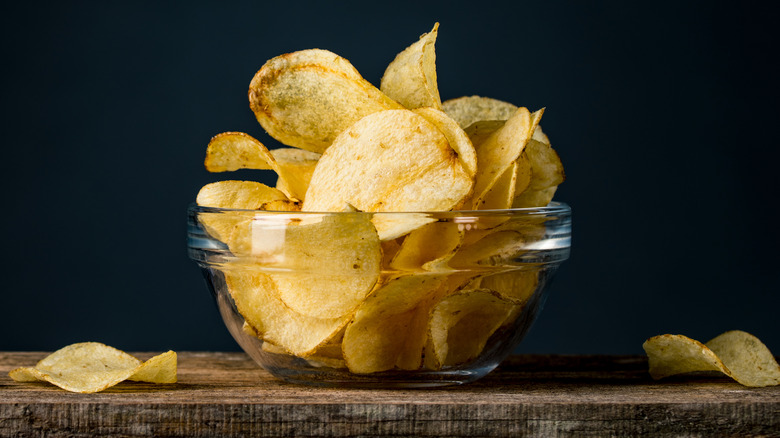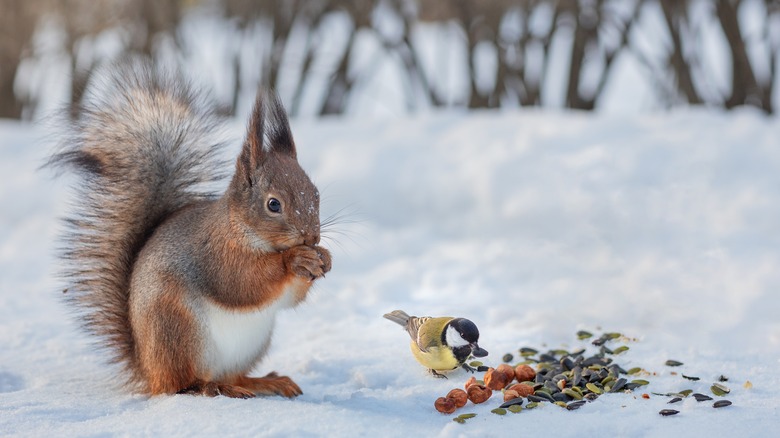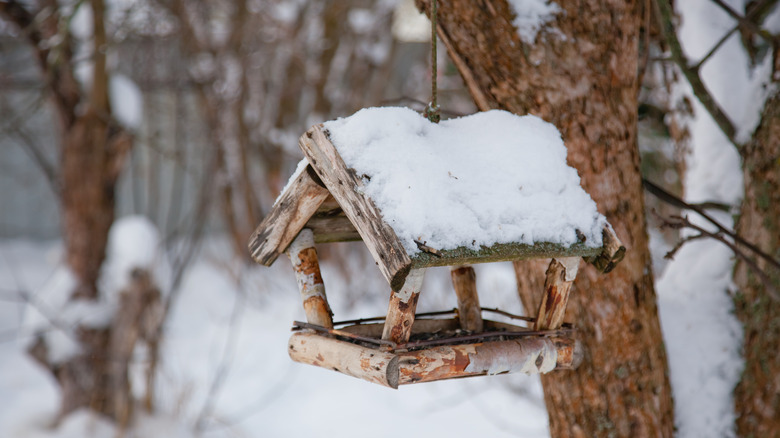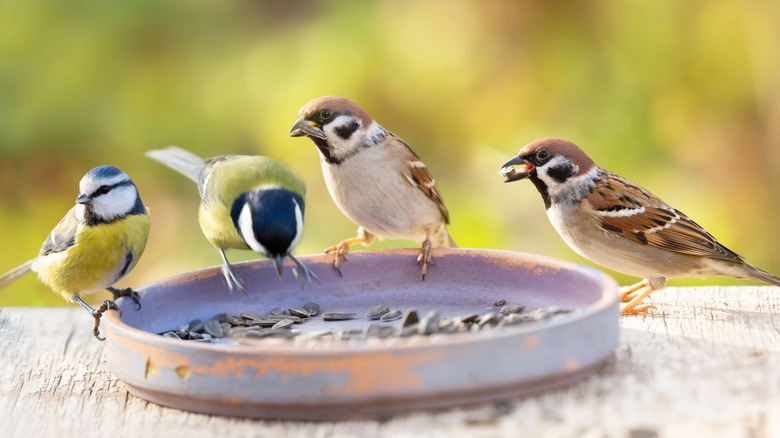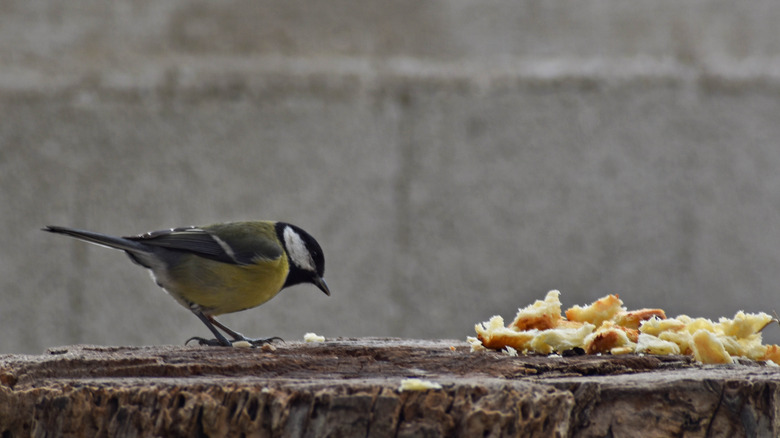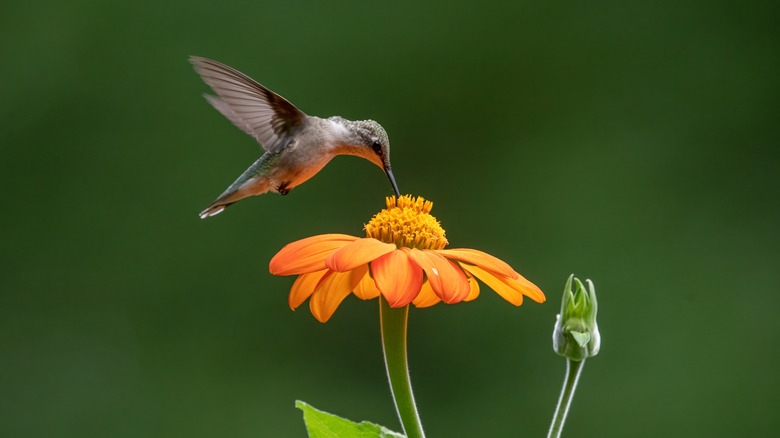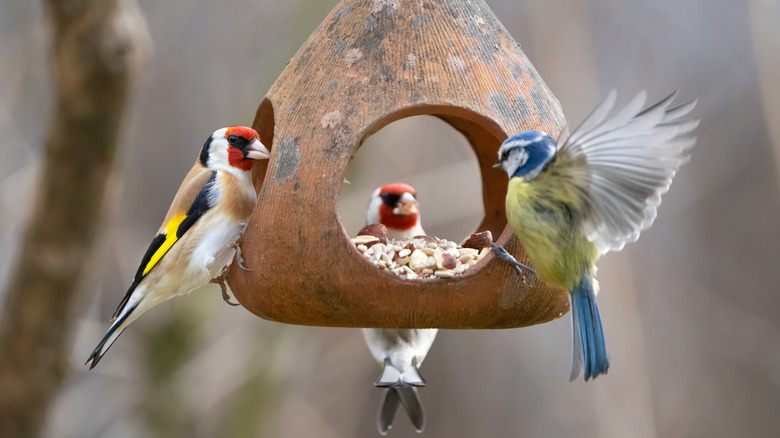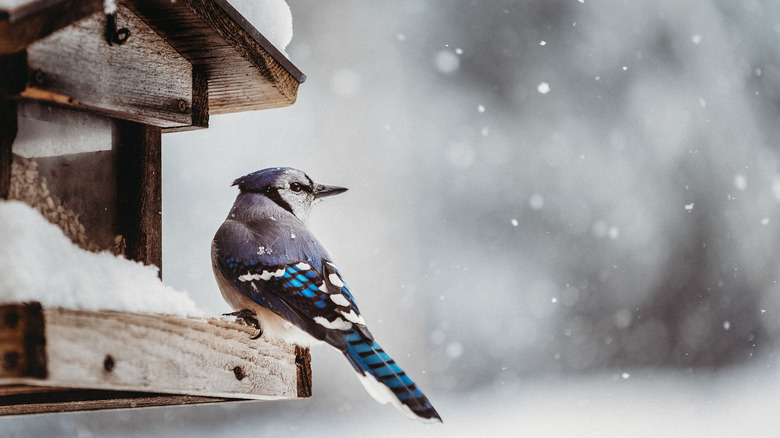Kitchen Scraps You Should Avoid Adding To Your Bird Feeder At All Costs
Nothing quite brightens up a yard like the presence of our little feathered friends. Birdsong has been proven as a natural way to reduce stress and banish the blues. Watching these delightful little creatures go about their daily business is an excellent way of reconnecting with nature and ignoring the less important things in life such as housework. Alongside purpose-made birdseed, kitchen scraps are a great way to entice the hordes of friendly frequent fliers into our yards. Yet be warned, you could be killing the birds with kindness.
It's never a pleasant thought to think that the hand that feeds could also be the hand that kills. However, food that is perfectly safe for us can be poisonous for anything with wings and a beak. Regular food items such as salted nuts, raw meat, fruit seeds, and even bread can cause anything from mild upset to in the more extreme cases, death. To avoid the worst scenario here's a list of kitchen scraps you should definitely avoid adding to your bird feeder.
Fruit seeds and pits
There's perhaps nothing more wholesome and refreshing than fruit. The crunchy crispness of a firm apple, the zesty tang of an orange, or the unfathomable texture of a ripe banana is manna from heaven. Naturally, when you're busy chopping up the pears or slicing into the delicate flesh of a peach, it's always tempting to put a little to one side for our feathered friends. As a rule, with the exception of avocado which can be quite toxic, fruit is fine for birds. However, the seeds and pits are a different story. And unless you're diligent in separating the seeds and pits from the fruits you could be putting a lot of birds at risk.
The seeds and pits of apples, plums, pears, cherries, apricots, and nectarines all contain a small amount of cyanide. Obviously, it exists in such minuscule quantities that eating the core of an apple or two isn't going to harm a human, but a bird's constitution is not as formidable. A few seeds might not harm them, but if they get their beaks into a selection of them scattered throughout the fruit placed in your feeder, it can lead to a rather grave situation. To stay on the safe side it's perhaps best to feed the birds only fruit with seeds and pits that are not poisonous to their systems, such as lemons, grapefruits, oranges, pomegranates, grapes, watermelon, cantaloupe, and cranberries. The ones that you should never put in your feeder include apples, cherries, apricots, avocados, peaches, and plums.
Potato chips can be poisonous
Potato chips are pretty irresistible to most mortals. Who amongst us hasn't lost all sense and reason when confronted with a comfort blanket of salt, carbohydrates, and saturated fat? Once you pop open the packet, it's pretty hard to stop the sweet crunch and pleasure cycle. Yet once the orgy of savory snacking is complete, it's often tempting to think that the birds might fancy your leftovers? After all, an average-sized bird needs to consume about 12% of its body fat in a 24-hour period.
Although potato chips are not prized for their nutritional value and are considered junk food, they can in theory be safe for birds. However, all that salt and saturated fat is not doing them any favors. Feeding them a steady diet of potato chips could eventually result in obesity and kidney problems. They could also become addicted to junk food at the expense of more nutritional feed. Additionally, the additives and preservatives found in many potato chips could be poisonous to some birds. Unless you're well versed with the ingredients and what they do, it's probably best to give potato chips a wide berth when it comes to your bird feeders.
Nuts with a lot of salt are a ticking sodium bomb
A lot of critters that walk on four legs, as well as two, go nutty about nuts. The bite-sized snacks have a consistency that's tough to beat. And when you add a little salt, well, the good just got better. Birds and nuts go together like chalk and cheese. The fat in these high-calorie snacks is healthy and helps keep them flying, chirping, and nesting from dawn to dusk. Nuts can also help keep their plumage in tip-top condition. Almonds, Brazil nuts, pecans, peanuts, walnuts, and macadamia nuts can all be a quality source of food for a variety of bids, but anything with salted or dry roasted written on the packet is a no-go!
Peanuts, either in a shell or crushed or kibbled, have been a popular choice of food to put in bird feeders for years. However, don't make the mistake of thinking you can pour the leftovers from a packet of dry roasted straight into the feeder. Birds are not built to digest that much salt content and it could make them extremely sick and in some cases kill them. It's also important to never put whole unsalted peanuts out during breeding season because if the birds feed them to their offspring they run the risk of accidentally choking them.
Chocolate can prove deadly
The sugar and fat content in chocolate can act like a drug to the brain. When that delicious dopamine begins running through your veins like an express train it's difficult to consider chocolate as anything but beneficial to life and limb. It's tempting to think that adding a little bit of the dark stuff to your bird feeder might be a sweet treat for our feathered friends and give them a little surge of energy during the winter months. Yet hold on to that half-eaten Snickers or Hershey bar because if god had wanted birds to eat chocolate, he would have grown it on trees.
Like dogs, birds are unable to stomach chocolate because its theobromine content is pure poison to their palettes. Derived from the cacao plant, the theobromine in chocolate is an alkaloid from the same family as caffeine, which is also toxic to birds. Dark chocolate is particularly dangerous for birds, and their extremely fast metabolism entails the effects of the theobromine will be fast acting. Symptoms include vomiting, fits, and heart attacks. Birds who live in regions such as South America where cacao grows naturally on trees, can survive after eating the sweet-tasting pulp found within the cacao pods. However, their trick to remaining unharmed is to simply spit out the seeds before they can do any damage.
A little garlic or onion can cause big problems
As well as being rumored to keep vampires at bay, garlic has numerous health benefits. Research suggests it can help boost your immune system, reduce blood pressure, and lower cholesterol levels. It's also a low-calorie and high-nutritional food source. In an ideal world, all of God's creatures would benefit from such a miraculous substance, but we do not live in that world. Although you might not add a clove of garlic to your bird feeder, the problem lies with the abundance of kitchen scraps that might contain garlic.
Garlic contains a chemical called allicin that can play havoc with a bird's system. Lethargy, amenia, vomiting, and diarrhea are a few of the symptoms that garlic can cause in birds. Like garlic, onions can also liven up the dullest dish, but they should also be strictly off the menu for birds. Onions have a high sulphur content which can aggravate a bird's digestive system and damage the insides of their mouths and stomachs. Byron J.S. de la Navarre, DVM at the Animal House of Chicago, told BeChewy, "Onions, garlic, chives, shallots, leek or anything containing these should be avoided."
Giving them bread is a common mistake
Much like rice, potatoes, and pasta, bread is a standard source of carbohydrates. It's a starchy source of energy that our bodies break down into glucose to keep us going until the day is done. Placing a little slightly stale bread in the bird feeder is as common as feeding the ducks in the park with a few leftover crusts. Bread is a basic staple of most diets and we all usually have quite a bit of leftovers hanging around. So, giving it to the birds seems a far better alternative to the trashcan. However, although it might seem harmless and plain, bread and birds have a complicated relationship, and placing it in their feeders is a common mistake.
Although bread will not poison the birds, its real danger is it doesn't offer them any nutritional value. The superfast metabolism of birds and their tiny stomachs require them to eat until they are completely full at every meal. Bread has a habit of quickly making them feel they couldn't take another beak and they leave the feeder feeling satisfied and well fed. Yet, bread does not contain the magic combination of carbs, fats, and proteins birds need to lead their high-energy lifestyles. With a stomach full of empty they're missing out on the real nourishment and calories they need to keep warm, fly, and stay alive for the duration.
Honey is not a sweet treat
Made by bees and sourced from plants, honey couldn't be any more natural. It's an antioxidant that is rich in nutrients and helps regulate blood sugar levels better than processed sugar. The bees love it, so why not the birds? As tempting as it might be to place a little blob of honey in a fat cake or suet cake for our little feathered friends, your sweet treat could soon turn sour. In particular, the temptation to substitute a hummingbird's sugar-water solution with honey is a common one, especially since they eat a lot of nectar. However, nectar goes through a lot of changes before it is converted to honey, and none of them are particularly good for hummingbirds.
Because of its sweetness and high-energy properties, birds will be naturally drawn to honey, but just like humans, they don't always appreciate that something that tastes so good can be quite bad for them. It can also be quite acidic and interfere with a bird's digestion process. Honey is also lacking in the high levels of specific nutrients birds require, and its high sugar content can be quite harmful to their health. The microorganisms found within raw honey can also cause botulism in birds. Pasteurized honey doesn't contain the same microorganisms but because it has been heated and treated it lacks even the limited nutritional value wild honey provides. If you feel the birds need a little sugar in their diet, dried berries or fruit are by far a safer option.
Uncooked and dry beans can be harmful
As a plant-based food that contains zero sodium or fat and is rich in protein, nutrients, and vitamins, beans come in a variety of types and sizes. At face value, if you have a little left on your dinner plate they appear to be the perfect food choice for birds. Although most are perfectly safe to feed our feathered friends with, if they are uncooked, undercooked, or dry, you run the risk of ruining their health. So, make sure you steam or boil those beans before letting the birds stick their beaks in. Frying them is not the best idea for obvious reasons.
When beans remain uncooked, particularly red kidney beans, they still contain high traces of a substance that is toxic to birds called hemagglutinin. Cooking the beans removes this substance common to many plants. Green beans, black beans, lentils, chickpeas, and peas are the safest for birds. Although birds can eat some undercooked beans it's best not to take any chances. Remember not to feed the birds any beans you have cooked with salt, oil, or added seasoning.
Dairy products can cause complications
Alongside bread, a little milk could be considered a hearty breakfast or supper for our feathered friends, but just as we have learned that bread is actually bad for them, dairy products can also cause complications. So, although it might be tempting to place that little leftover milk in a saucer, or that little chunk of cheese out for the birds on a bitterly cold morning, your good intentions could have dire consequences.
As a rule, most birds are lactose intolerant and cannot enjoy the creamy things in life without risk. Full-fat milk and soft cheeses are especially harsh on them. Baby birds in particular should not be exposed to dairy products. Although birds are big fans of worms, it's also wise not to put any sort of leftover raw meat in your feeders. It can begin to rot very quickly and cultivate some very harmful strains of bacteria. If you wish to give the birds a protein kick, fatty suet is a better choice to keep them energized and healthy.
